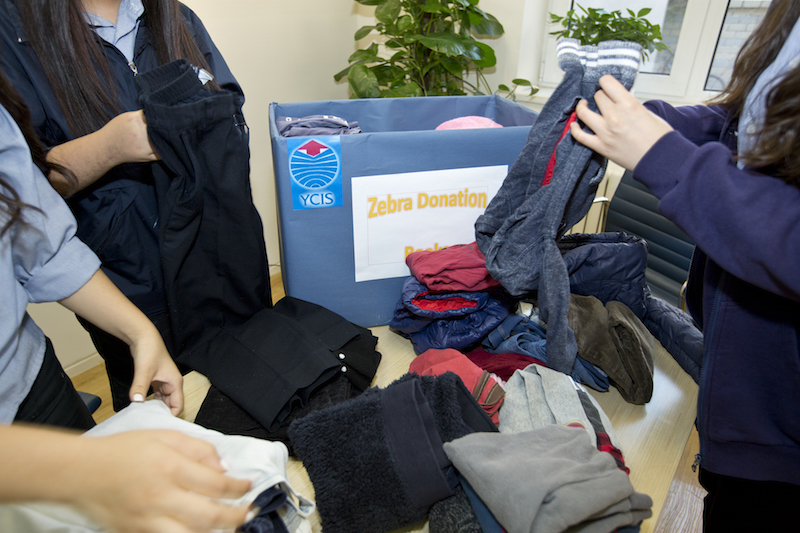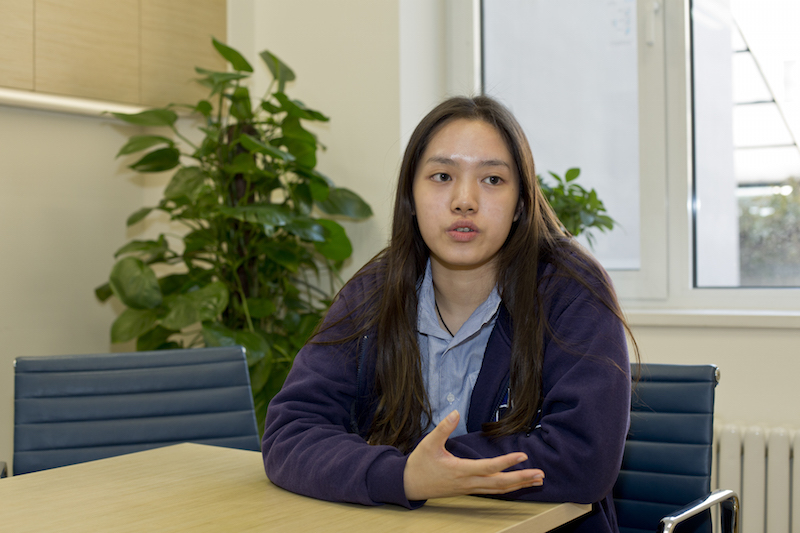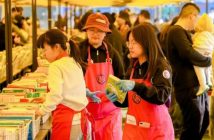Chilly winds sting their tender young cheeks and bore through their flimsy clothes, leaving the students of Banma Tibetan Secondary School in the remote Qinghai province uncomfortable and troubled. However, this winter they will eagerly receive a generous donation of clothes from students who not only are far more fortunate but also have the awareness and work ethic to pass some of that good fortune on.
These are the inspiring aspects of the Zebra project, an endeavor spearheaded by a group of volunteers at the Yew Chung International School of Beijing (YCIS Beijing). Below, project leader and Year 13 student Zoe Lin, along with fellow Year 11 project members Selina Huang and Sophie Zhao, tell us more about the clothing drive that is helping to keep needy Qinghai children warm though the winter, as well as how the project has been both fulfilling and inspiring.
 How did you get involved with the Zebra project?
How did you get involved with the Zebra project?
Zoe Lin: My library teacher introduced me to this project last year. He said he had a great project that helped people in Qinghai. At the time my classmate was the leader. We only made a clothing donation last year and I didn’t think it was that successful, because the clothing was not so useful to the Qinghai children.

Huang and Zhao (left to right) describe working on the project
How did you address this challenge?
ZL: This year we spent a lot of time arranging and sorting the clothes into different types. There’s many things to consider while doing that. For instance it has to be winter clothing because it’s cold there. I kept in touch with the Qinghai school’s principal on WeChat, and he said that they really needed clothes and stationery for the children, so we only focused on those two things.
Selina and Sophie, how did you both get involved?
Selina Huang: I signed up for this project because I thought it would be very helpful for the children. It feels good to help them; not everyone is as fortunate as myself and my classmates.
Sophie Zhao: This is my second time working on this project and I really enjoy it. It makes me very happy to help these children.
How will this help the children specifically?
ZL: I’m going to write letters to them on some of the stationery, to encourage them in their studies. Also, the families in this Qinghai village often have five or more children each, so the clothes can be hand-me-downs for a long time.
Aside from the clothes, we also are donating a Chinese book to the students, because they are mostly ethnic minority students and can’t speak Mandarin very well. These books will help them with basic pinyin. Also, we will have an activity during our Christmas ball that will help us raise money for the stationery.
SZ: I look forward to writing to them on the stationery as well. I’d love to ask them more about what their lives are like.

Lin says: “I love the moment when I see lots of clothes and books in the donation box, and the moment when the supervising teachers tell us it’s a great project.”
How have YCIS Beijing’s teachers helped you?
ZL: At the beginning of this year’s planning stage, I wanted YCIS students to donate clothes. I emailed the Vice-Principal of our Primary School and he really helped me get the message out to Primary School teachers. I gave a presentation in an assembly for students in Years 5-6, and I also went around to their homerooms and told them why it was a good idea to donate to these children. Without the teacher’s help, I couldn’t have done these things.
What have you enjoyed most about working on this project?
ZL: I love the moment when I see lots of clothes and books in the donation box, as well as when the supervising teachers tell us it’s a great project. When people say that, it’s very encouraging and I feel like we’ve succeeded.
SH: I really liked the process of encouraging everyone to donate things. It was also fun making posters to promote the clothing drive.
How has this project affected your view of the world?
SH: Before working on this project, I never put so much time into thinking about less fortunate people’s lives. This has been really good for raising my awareness.
SZ: Yes, their lives are totally different from ours. Their clothes are not very good quality, and they have much less than us. While it’s sad to learn about that, it feels so good to help them.
ZL: The average temperature there is zero degrees. It really moved me to know children so young are living in such discomfort and poverty, so I was eager to help them.
And how has this project helped you in other areas, like academics?
ZL: Time management, definitely (laughs). Before this, I wasn’t much of a planner, but after being in charge of this project I have a plan for almost everything and am much more organized.
This post is sponsored by YCIS Beijing
Photos: Uni You




